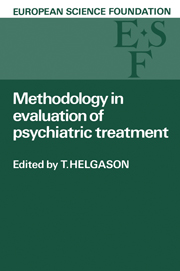 Methodology in Evaluation of Psychiatric Treatment
Methodology in Evaluation of Psychiatric Treatment Book contents
- Frontmatter
- Contents
- Participants
- Foreword
- Preface
- INTRODUCTION
- I METHODS OF CLASSIFICATION
- II EVALUATION CRITERIA
- III RATING METHODS IN EVALUATION OF TREATMENT
- IV OTHER QUANTITATIVE METHODS OFEVALUATION OF TREATMENT
- V ETHICALAND PRACTICAL PROBLEMS
- Ethical and Practical Problems in Therapeutic Research in Psychiatry
- Index
Ethical and Practical Problems in Therapeutic Research in Psychiatry
from V - ETHICALAND PRACTICAL PROBLEMS
- Frontmatter
- Contents
- Participants
- Foreword
- Preface
- INTRODUCTION
- I METHODS OF CLASSIFICATION
- II EVALUATION CRITERIA
- III RATING METHODS IN EVALUATION OF TREATMENT
- IV OTHER QUANTITATIVE METHODS OFEVALUATION OF TREATMENT
- V ETHICALAND PRACTICAL PROBLEMS
- Ethical and Practical Problems in Therapeutic Research in Psychiatry
- Index
Summary
Basic statements
Therapeutic research in psychiatry cannot be done without patients. The main reason is that therapeutic effects can be established only against diseases, but adequate disease models of most human specific psychiatric diseases do not exist. Furthermore, knowledge gained from pre- or extra-clinical investigations can be applied only to a rather limited extent to psychiatric patients, particularly to those with more severe psychiatric diseases. This is valid not only for the results of animal pharmacology (Helmchen & Muller-Oerlinghausen 1978)”, but also for observations with psychological procedures, called psychotherapy, on non-psychiatric people - for example, psychoanalytic experiences in healthy persons, or results of behaviour modification in smokers or obese clients (!) (Helmchen et0/1982) or even for sociological hypotheses such as the labelling theory, the irrelevance of which has been shown for some psychiatric diseases (van Praag 1978).
But the validity of results from investigations with psychiatric patients is limited too. The more the scope of a piece of research is narrowed, for example by a high selection of patients, by quasi-experimental standardization of the setting, or by short duration of controlled clinical trials, the less general will be the application of its results, and the more clearly the question must be answered -whether such trials are ethically justified. From this comes the demand for developing research methods that will be less difficult ethically and yet justified scientifically. Examples are methods for research in ‘natural’ settings or with out-patients or over long periods (Helmchen 1978; Lasagna 1974; Linden & Schussler 1981; Ruther et 0/1980; Wing 1981). However, it should be added that of course for different research questions, different methods and designs have to be applied, and their ethical implications must be considered separately in any project.
Insofar as therapeutic research in psychiatry cannot be done without patients it is related to therapeutic practice. Its framework can be defined by three statements:
Therapy
Therapy in a broad sense includes techniques and attitudes. The term is used here for all procedures that prevent or remove a disease or shorten or attenuate the natural course of it and disease-related handicaps in the individual. By therapeutic attitude is meant the ability to assist the patient not only to overcome the illness by himself but also to endure it. It is the background for an adequate application of the therapeutic knowledge.
- Type
- Chapter
- Information
- Methodology in Evaluation of Psychiatric TreatmentProceedings of a Workshop Held in Vienna 10–13 June 1981, pp. 251 - 264Publisher: Cambridge University PressPrint publication year: 1983


